University Business Ethics: Reflection on Teaching and Learning
VerifiedAdded on 2022/08/24
|9
|2738
|14
Report
AI Summary
This report provides a comprehensive reflection on the student's learning experience in a business ethics course. It begins with an overview of the student's existing understanding of business ethics, emphasizing the importance of ethical practices, corporate governance, and social responsibility. The report delves into key topics such as ethical decision-making, corporate culture, and the significance of reasoning and logical thinking in the classroom. The student analyzes the ethical decision-making process within business management, highlighting the role of moral principles, religious influences, and community involvement. The report also examines the impact of corporate culture on employee behavior and decision-making, emphasizing the importance of ethical codes and training programs. The student reflects on the classroom environment, emphasizing the value of stimulating discussions, problem-solving activities, and the development of critical thinking skills. The report concludes by expressing the student's confidence in applying the learned concepts to the business world.
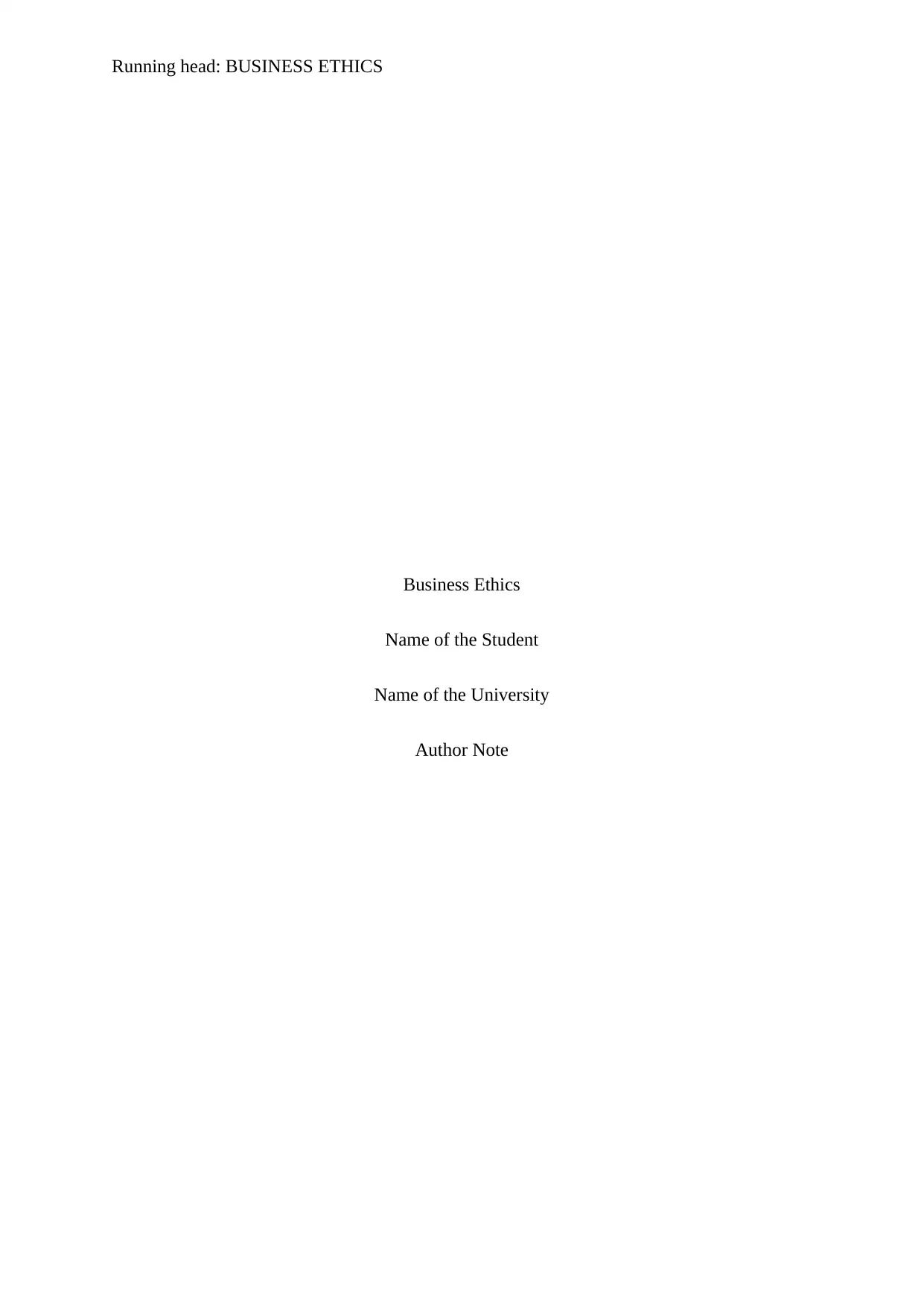
Running head: BUSINESS ETHICS
Business Ethics
Name of the Student
Name of the University
Author Note
Business Ethics
Name of the Student
Name of the University
Author Note
Paraphrase This Document
Need a fresh take? Get an instant paraphrase of this document with our AI Paraphraser
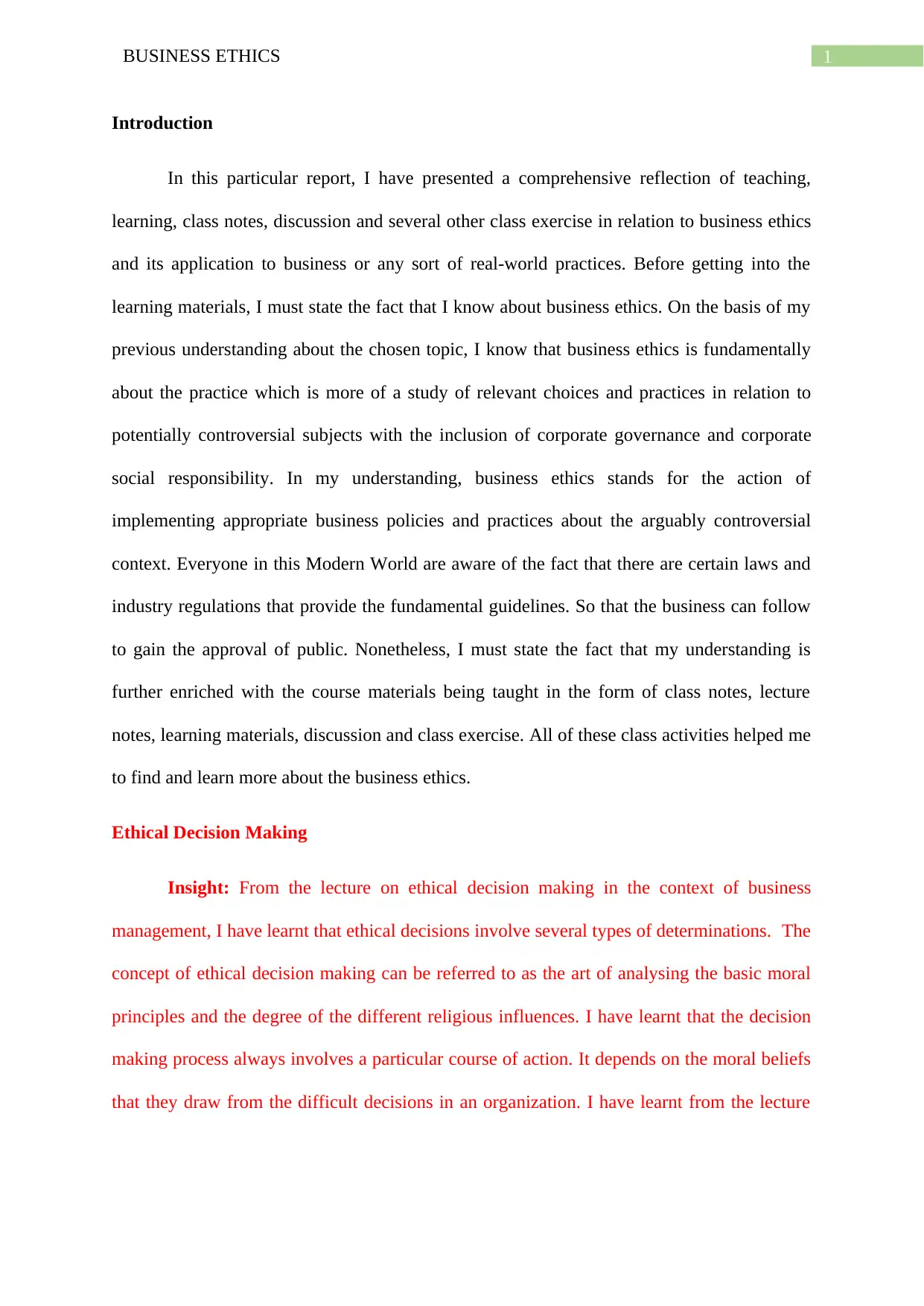
1BUSINESS ETHICS
Introduction
In this particular report, I have presented a comprehensive reflection of teaching,
learning, class notes, discussion and several other class exercise in relation to business ethics
and its application to business or any sort of real-world practices. Before getting into the
learning materials, I must state the fact that I know about business ethics. On the basis of my
previous understanding about the chosen topic, I know that business ethics is fundamentally
about the practice which is more of a study of relevant choices and practices in relation to
potentially controversial subjects with the inclusion of corporate governance and corporate
social responsibility. In my understanding, business ethics stands for the action of
implementing appropriate business policies and practices about the arguably controversial
context. Everyone in this Modern World are aware of the fact that there are certain laws and
industry regulations that provide the fundamental guidelines. So that the business can follow
to gain the approval of public. Nonetheless, I must state the fact that my understanding is
further enriched with the course materials being taught in the form of class notes, lecture
notes, learning materials, discussion and class exercise. All of these class activities helped me
to find and learn more about the business ethics.
Ethical Decision Making
Insight: From the lecture on ethical decision making in the context of business
management, I have learnt that ethical decisions involve several types of determinations. The
concept of ethical decision making can be referred to as the art of analysing the basic moral
principles and the degree of the different religious influences. I have learnt that the decision
making process always involves a particular course of action. It depends on the moral beliefs
that they draw from the difficult decisions in an organization. I have learnt from the lecture
Introduction
In this particular report, I have presented a comprehensive reflection of teaching,
learning, class notes, discussion and several other class exercise in relation to business ethics
and its application to business or any sort of real-world practices. Before getting into the
learning materials, I must state the fact that I know about business ethics. On the basis of my
previous understanding about the chosen topic, I know that business ethics is fundamentally
about the practice which is more of a study of relevant choices and practices in relation to
potentially controversial subjects with the inclusion of corporate governance and corporate
social responsibility. In my understanding, business ethics stands for the action of
implementing appropriate business policies and practices about the arguably controversial
context. Everyone in this Modern World are aware of the fact that there are certain laws and
industry regulations that provide the fundamental guidelines. So that the business can follow
to gain the approval of public. Nonetheless, I must state the fact that my understanding is
further enriched with the course materials being taught in the form of class notes, lecture
notes, learning materials, discussion and class exercise. All of these class activities helped me
to find and learn more about the business ethics.
Ethical Decision Making
Insight: From the lecture on ethical decision making in the context of business
management, I have learnt that ethical decisions involve several types of determinations. The
concept of ethical decision making can be referred to as the art of analysing the basic moral
principles and the degree of the different religious influences. I have learnt that the decision
making process always involves a particular course of action. It depends on the moral beliefs
that they draw from the difficult decisions in an organization. I have learnt from the lecture
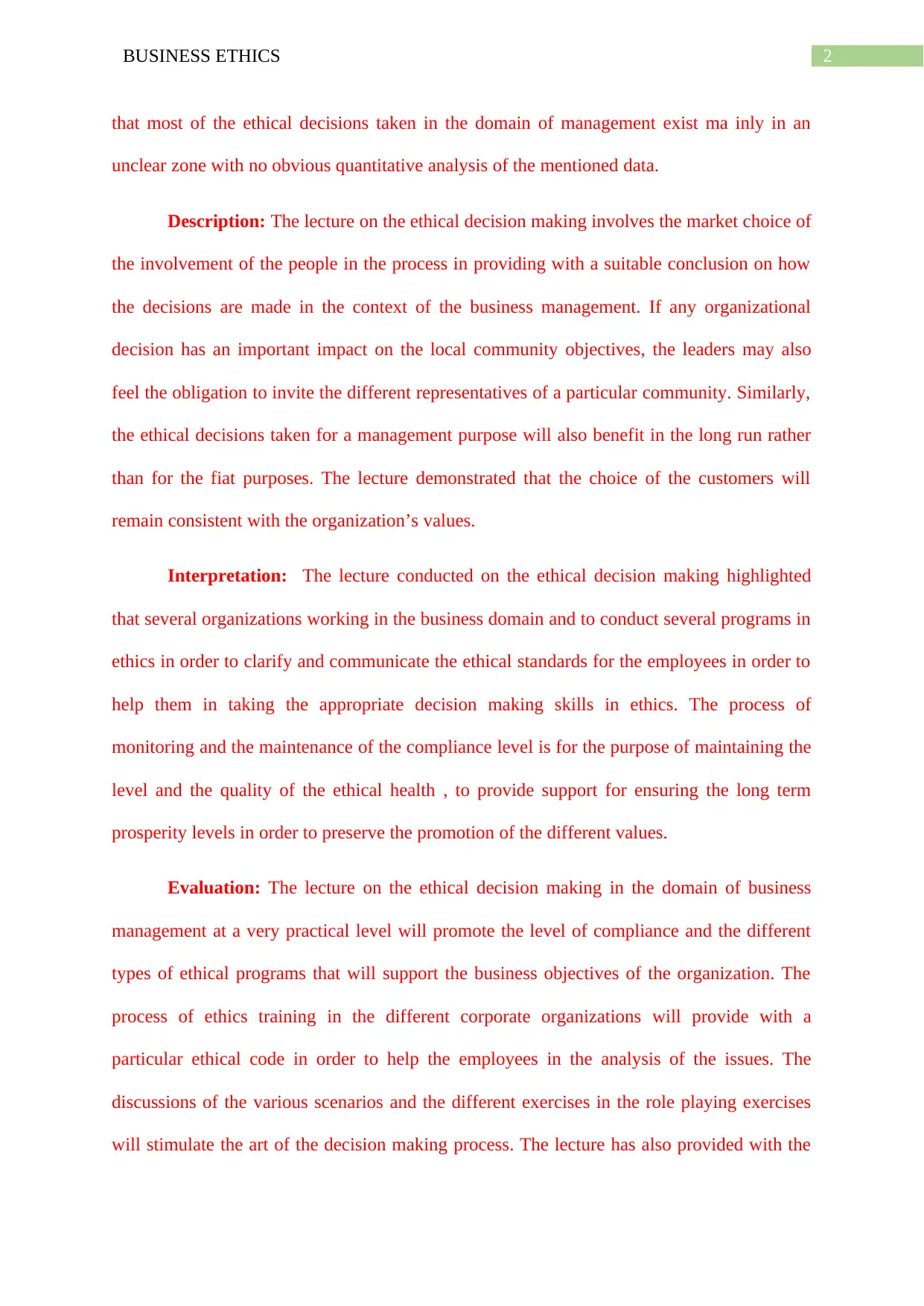
2BUSINESS ETHICS
that most of the ethical decisions taken in the domain of management exist ma inly in an
unclear zone with no obvious quantitative analysis of the mentioned data.
Description: The lecture on the ethical decision making involves the market choice of
the involvement of the people in the process in providing with a suitable conclusion on how
the decisions are made in the context of the business management. If any organizational
decision has an important impact on the local community objectives, the leaders may also
feel the obligation to invite the different representatives of a particular community. Similarly,
the ethical decisions taken for a management purpose will also benefit in the long run rather
than for the fiat purposes. The lecture demonstrated that the choice of the customers will
remain consistent with the organization’s values.
Interpretation: The lecture conducted on the ethical decision making highlighted
that several organizations working in the business domain and to conduct several programs in
ethics in order to clarify and communicate the ethical standards for the employees in order to
help them in taking the appropriate decision making skills in ethics. The process of
monitoring and the maintenance of the compliance level is for the purpose of maintaining the
level and the quality of the ethical health , to provide support for ensuring the long term
prosperity levels in order to preserve the promotion of the different values.
Evaluation: The lecture on the ethical decision making in the domain of business
management at a very practical level will promote the level of compliance and the different
types of ethical programs that will support the business objectives of the organization. The
process of ethics training in the different corporate organizations will provide with a
particular ethical code in order to help the employees in the analysis of the issues. The
discussions of the various scenarios and the different exercises in the role playing exercises
will stimulate the art of the decision making process. The lecture has also provided with the
that most of the ethical decisions taken in the domain of management exist ma inly in an
unclear zone with no obvious quantitative analysis of the mentioned data.
Description: The lecture on the ethical decision making involves the market choice of
the involvement of the people in the process in providing with a suitable conclusion on how
the decisions are made in the context of the business management. If any organizational
decision has an important impact on the local community objectives, the leaders may also
feel the obligation to invite the different representatives of a particular community. Similarly,
the ethical decisions taken for a management purpose will also benefit in the long run rather
than for the fiat purposes. The lecture demonstrated that the choice of the customers will
remain consistent with the organization’s values.
Interpretation: The lecture conducted on the ethical decision making highlighted
that several organizations working in the business domain and to conduct several programs in
ethics in order to clarify and communicate the ethical standards for the employees in order to
help them in taking the appropriate decision making skills in ethics. The process of
monitoring and the maintenance of the compliance level is for the purpose of maintaining the
level and the quality of the ethical health , to provide support for ensuring the long term
prosperity levels in order to preserve the promotion of the different values.
Evaluation: The lecture on the ethical decision making in the domain of business
management at a very practical level will promote the level of compliance and the different
types of ethical programs that will support the business objectives of the organization. The
process of ethics training in the different corporate organizations will provide with a
particular ethical code in order to help the employees in the analysis of the issues. The
discussions of the various scenarios and the different exercises in the role playing exercises
will stimulate the art of the decision making process. The lecture has also provided with the
⊘ This is a preview!⊘
Do you want full access?
Subscribe today to unlock all pages.

Trusted by 1+ million students worldwide
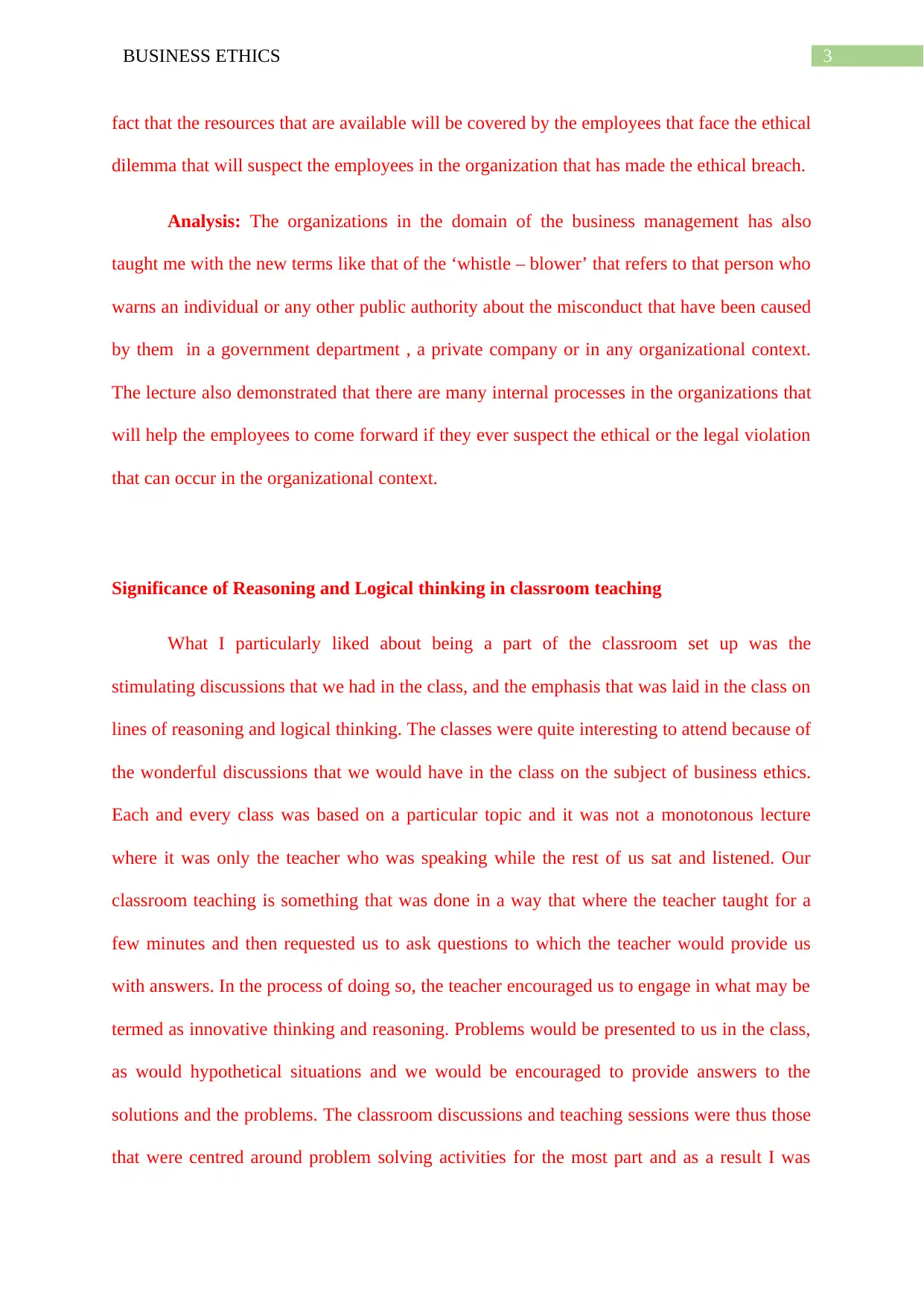
3BUSINESS ETHICS
fact that the resources that are available will be covered by the employees that face the ethical
dilemma that will suspect the employees in the organization that has made the ethical breach.
Analysis: The organizations in the domain of the business management has also
taught me with the new terms like that of the ‘whistle – blower’ that refers to that person who
warns an individual or any other public authority about the misconduct that have been caused
by them in a government department , a private company or in any organizational context.
The lecture also demonstrated that there are many internal processes in the organizations that
will help the employees to come forward if they ever suspect the ethical or the legal violation
that can occur in the organizational context.
Significance of Reasoning and Logical thinking in classroom teaching
What I particularly liked about being a part of the classroom set up was the
stimulating discussions that we had in the class, and the emphasis that was laid in the class on
lines of reasoning and logical thinking. The classes were quite interesting to attend because of
the wonderful discussions that we would have in the class on the subject of business ethics.
Each and every class was based on a particular topic and it was not a monotonous lecture
where it was only the teacher who was speaking while the rest of us sat and listened. Our
classroom teaching is something that was done in a way that where the teacher taught for a
few minutes and then requested us to ask questions to which the teacher would provide us
with answers. In the process of doing so, the teacher encouraged us to engage in what may be
termed as innovative thinking and reasoning. Problems would be presented to us in the class,
as would hypothetical situations and we would be encouraged to provide answers to the
solutions and the problems. The classroom discussions and teaching sessions were thus those
that were centred around problem solving activities for the most part and as a result I was
fact that the resources that are available will be covered by the employees that face the ethical
dilemma that will suspect the employees in the organization that has made the ethical breach.
Analysis: The organizations in the domain of the business management has also
taught me with the new terms like that of the ‘whistle – blower’ that refers to that person who
warns an individual or any other public authority about the misconduct that have been caused
by them in a government department , a private company or in any organizational context.
The lecture also demonstrated that there are many internal processes in the organizations that
will help the employees to come forward if they ever suspect the ethical or the legal violation
that can occur in the organizational context.
Significance of Reasoning and Logical thinking in classroom teaching
What I particularly liked about being a part of the classroom set up was the
stimulating discussions that we had in the class, and the emphasis that was laid in the class on
lines of reasoning and logical thinking. The classes were quite interesting to attend because of
the wonderful discussions that we would have in the class on the subject of business ethics.
Each and every class was based on a particular topic and it was not a monotonous lecture
where it was only the teacher who was speaking while the rest of us sat and listened. Our
classroom teaching is something that was done in a way that where the teacher taught for a
few minutes and then requested us to ask questions to which the teacher would provide us
with answers. In the process of doing so, the teacher encouraged us to engage in what may be
termed as innovative thinking and reasoning. Problems would be presented to us in the class,
as would hypothetical situations and we would be encouraged to provide answers to the
solutions and the problems. The classroom discussions and teaching sessions were thus those
that were centred around problem solving activities for the most part and as a result I was
Paraphrase This Document
Need a fresh take? Get an instant paraphrase of this document with our AI Paraphraser
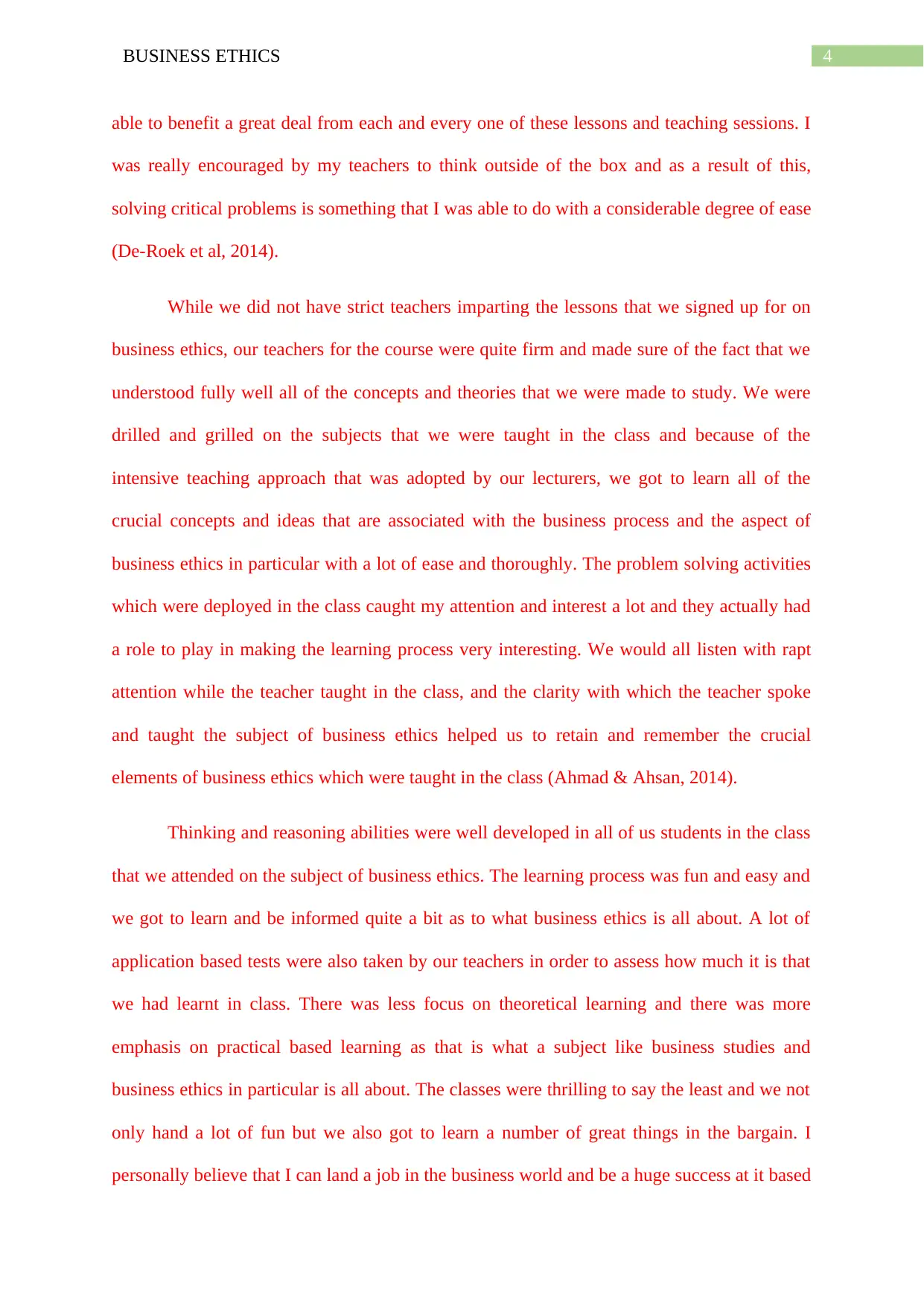
4BUSINESS ETHICS
able to benefit a great deal from each and every one of these lessons and teaching sessions. I
was really encouraged by my teachers to think outside of the box and as a result of this,
solving critical problems is something that I was able to do with a considerable degree of ease
(De-Roek et al, 2014).
While we did not have strict teachers imparting the lessons that we signed up for on
business ethics, our teachers for the course were quite firm and made sure of the fact that we
understood fully well all of the concepts and theories that we were made to study. We were
drilled and grilled on the subjects that we were taught in the class and because of the
intensive teaching approach that was adopted by our lecturers, we got to learn all of the
crucial concepts and ideas that are associated with the business process and the aspect of
business ethics in particular with a lot of ease and thoroughly. The problem solving activities
which were deployed in the class caught my attention and interest a lot and they actually had
a role to play in making the learning process very interesting. We would all listen with rapt
attention while the teacher taught in the class, and the clarity with which the teacher spoke
and taught the subject of business ethics helped us to retain and remember the crucial
elements of business ethics which were taught in the class (Ahmad & Ahsan, 2014).
Thinking and reasoning abilities were well developed in all of us students in the class
that we attended on the subject of business ethics. The learning process was fun and easy and
we got to learn and be informed quite a bit as to what business ethics is all about. A lot of
application based tests were also taken by our teachers in order to assess how much it is that
we had learnt in class. There was less focus on theoretical learning and there was more
emphasis on practical based learning as that is what a subject like business studies and
business ethics in particular is all about. The classes were thrilling to say the least and we not
only hand a lot of fun but we also got to learn a number of great things in the bargain. I
personally believe that I can land a job in the business world and be a huge success at it based
able to benefit a great deal from each and every one of these lessons and teaching sessions. I
was really encouraged by my teachers to think outside of the box and as a result of this,
solving critical problems is something that I was able to do with a considerable degree of ease
(De-Roek et al, 2014).
While we did not have strict teachers imparting the lessons that we signed up for on
business ethics, our teachers for the course were quite firm and made sure of the fact that we
understood fully well all of the concepts and theories that we were made to study. We were
drilled and grilled on the subjects that we were taught in the class and because of the
intensive teaching approach that was adopted by our lecturers, we got to learn all of the
crucial concepts and ideas that are associated with the business process and the aspect of
business ethics in particular with a lot of ease and thoroughly. The problem solving activities
which were deployed in the class caught my attention and interest a lot and they actually had
a role to play in making the learning process very interesting. We would all listen with rapt
attention while the teacher taught in the class, and the clarity with which the teacher spoke
and taught the subject of business ethics helped us to retain and remember the crucial
elements of business ethics which were taught in the class (Ahmad & Ahsan, 2014).
Thinking and reasoning abilities were well developed in all of us students in the class
that we attended on the subject of business ethics. The learning process was fun and easy and
we got to learn and be informed quite a bit as to what business ethics is all about. A lot of
application based tests were also taken by our teachers in order to assess how much it is that
we had learnt in class. There was less focus on theoretical learning and there was more
emphasis on practical based learning as that is what a subject like business studies and
business ethics in particular is all about. The classes were thrilling to say the least and we not
only hand a lot of fun but we also got to learn a number of great things in the bargain. I
personally believe that I can land a job in the business world and be a huge success at it based
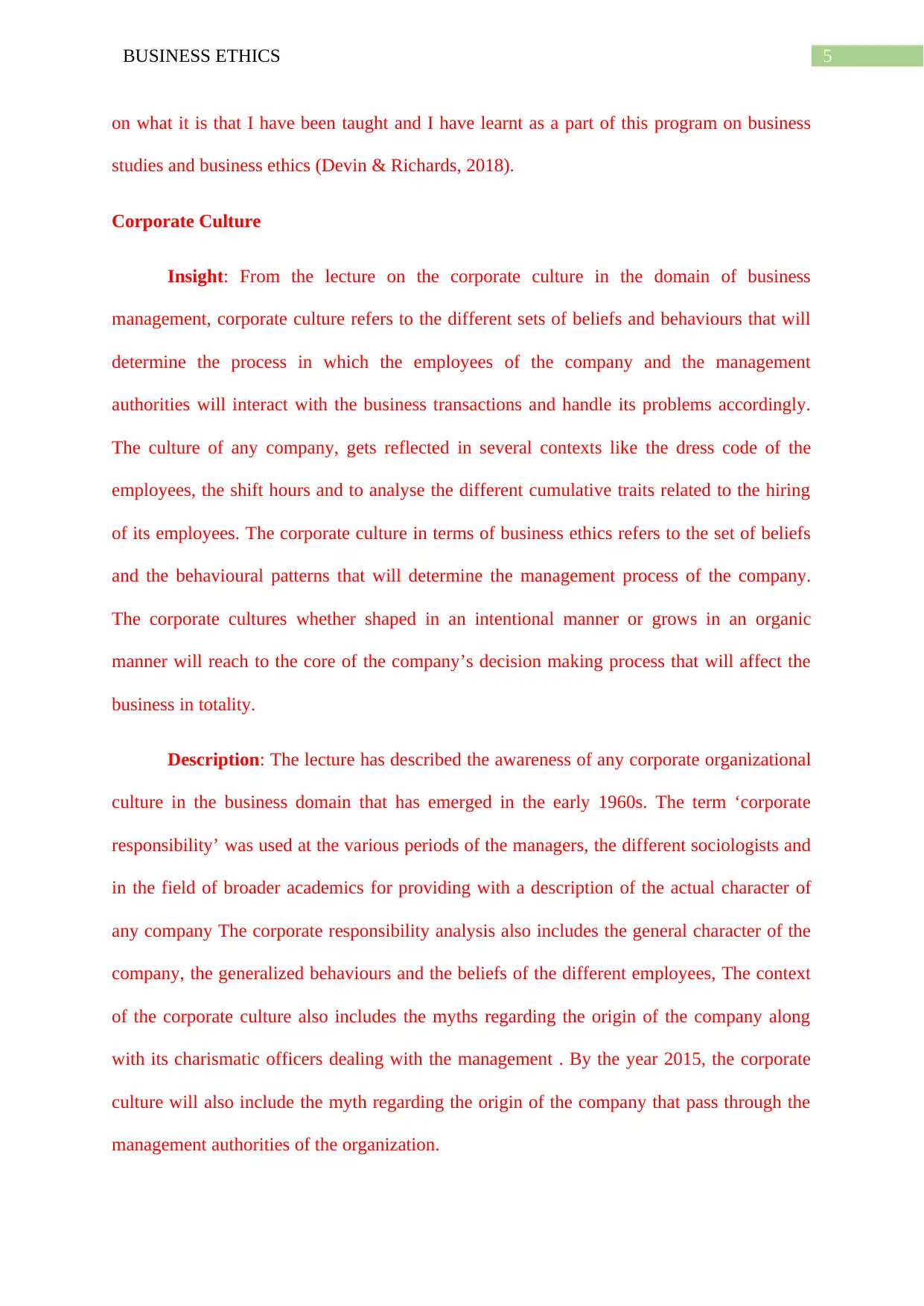
5BUSINESS ETHICS
on what it is that I have been taught and I have learnt as a part of this program on business
studies and business ethics (Devin & Richards, 2018).
Corporate Culture
Insight: From the lecture on the corporate culture in the domain of business
management, corporate culture refers to the different sets of beliefs and behaviours that will
determine the process in which the employees of the company and the management
authorities will interact with the business transactions and handle its problems accordingly.
The culture of any company, gets reflected in several contexts like the dress code of the
employees, the shift hours and to analyse the different cumulative traits related to the hiring
of its employees. The corporate culture in terms of business ethics refers to the set of beliefs
and the behavioural patterns that will determine the management process of the company.
The corporate cultures whether shaped in an intentional manner or grows in an organic
manner will reach to the core of the company’s decision making process that will affect the
business in totality.
Description: The lecture has described the awareness of any corporate organizational
culture in the business domain that has emerged in the early 1960s. The term ‘corporate
responsibility’ was used at the various periods of the managers, the different sociologists and
in the field of broader academics for providing with a description of the actual character of
any company The corporate responsibility analysis also includes the general character of the
company, the generalized behaviours and the beliefs of the different employees, The context
of the corporate culture also includes the myths regarding the origin of the company along
with its charismatic officers dealing with the management . By the year 2015, the corporate
culture will also include the myth regarding the origin of the company that pass through the
management authorities of the organization.
on what it is that I have been taught and I have learnt as a part of this program on business
studies and business ethics (Devin & Richards, 2018).
Corporate Culture
Insight: From the lecture on the corporate culture in the domain of business
management, corporate culture refers to the different sets of beliefs and behaviours that will
determine the process in which the employees of the company and the management
authorities will interact with the business transactions and handle its problems accordingly.
The culture of any company, gets reflected in several contexts like the dress code of the
employees, the shift hours and to analyse the different cumulative traits related to the hiring
of its employees. The corporate culture in terms of business ethics refers to the set of beliefs
and the behavioural patterns that will determine the management process of the company.
The corporate cultures whether shaped in an intentional manner or grows in an organic
manner will reach to the core of the company’s decision making process that will affect the
business in totality.
Description: The lecture has described the awareness of any corporate organizational
culture in the business domain that has emerged in the early 1960s. The term ‘corporate
responsibility’ was used at the various periods of the managers, the different sociologists and
in the field of broader academics for providing with a description of the actual character of
any company The corporate responsibility analysis also includes the general character of the
company, the generalized behaviours and the beliefs of the different employees, The context
of the corporate culture also includes the myths regarding the origin of the company along
with its charismatic officers dealing with the management . By the year 2015, the corporate
culture will also include the myth regarding the origin of the company that pass through the
management authorities of the organization.
⊘ This is a preview!⊘
Do you want full access?
Subscribe today to unlock all pages.

Trusted by 1+ million students worldwide
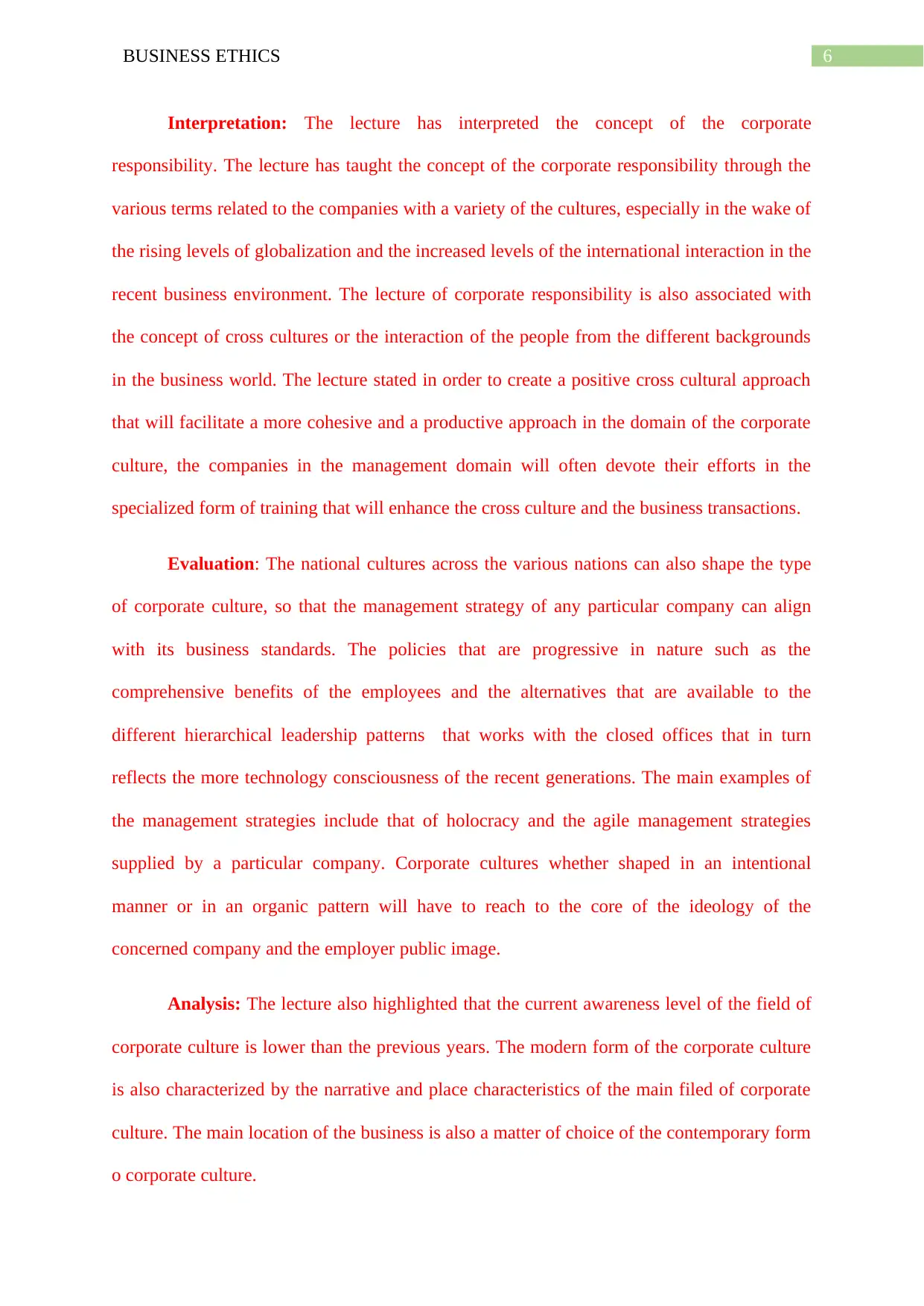
6BUSINESS ETHICS
Interpretation: The lecture has interpreted the concept of the corporate
responsibility. The lecture has taught the concept of the corporate responsibility through the
various terms related to the companies with a variety of the cultures, especially in the wake of
the rising levels of globalization and the increased levels of the international interaction in the
recent business environment. The lecture of corporate responsibility is also associated with
the concept of cross cultures or the interaction of the people from the different backgrounds
in the business world. The lecture stated in order to create a positive cross cultural approach
that will facilitate a more cohesive and a productive approach in the domain of the corporate
culture, the companies in the management domain will often devote their efforts in the
specialized form of training that will enhance the cross culture and the business transactions.
Evaluation: The national cultures across the various nations can also shape the type
of corporate culture, so that the management strategy of any particular company can align
with its business standards. The policies that are progressive in nature such as the
comprehensive benefits of the employees and the alternatives that are available to the
different hierarchical leadership patterns that works with the closed offices that in turn
reflects the more technology consciousness of the recent generations. The main examples of
the management strategies include that of holocracy and the agile management strategies
supplied by a particular company. Corporate cultures whether shaped in an intentional
manner or in an organic pattern will have to reach to the core of the ideology of the
concerned company and the employer public image.
Analysis: The lecture also highlighted that the current awareness level of the field of
corporate culture is lower than the previous years. The modern form of the corporate culture
is also characterized by the narrative and place characteristics of the main filed of corporate
culture. The main location of the business is also a matter of choice of the contemporary form
o corporate culture.
Interpretation: The lecture has interpreted the concept of the corporate
responsibility. The lecture has taught the concept of the corporate responsibility through the
various terms related to the companies with a variety of the cultures, especially in the wake of
the rising levels of globalization and the increased levels of the international interaction in the
recent business environment. The lecture of corporate responsibility is also associated with
the concept of cross cultures or the interaction of the people from the different backgrounds
in the business world. The lecture stated in order to create a positive cross cultural approach
that will facilitate a more cohesive and a productive approach in the domain of the corporate
culture, the companies in the management domain will often devote their efforts in the
specialized form of training that will enhance the cross culture and the business transactions.
Evaluation: The national cultures across the various nations can also shape the type
of corporate culture, so that the management strategy of any particular company can align
with its business standards. The policies that are progressive in nature such as the
comprehensive benefits of the employees and the alternatives that are available to the
different hierarchical leadership patterns that works with the closed offices that in turn
reflects the more technology consciousness of the recent generations. The main examples of
the management strategies include that of holocracy and the agile management strategies
supplied by a particular company. Corporate cultures whether shaped in an intentional
manner or in an organic pattern will have to reach to the core of the ideology of the
concerned company and the employer public image.
Analysis: The lecture also highlighted that the current awareness level of the field of
corporate culture is lower than the previous years. The modern form of the corporate culture
is also characterized by the narrative and place characteristics of the main filed of corporate
culture. The main location of the business is also a matter of choice of the contemporary form
o corporate culture.
Paraphrase This Document
Need a fresh take? Get an instant paraphrase of this document with our AI Paraphraser
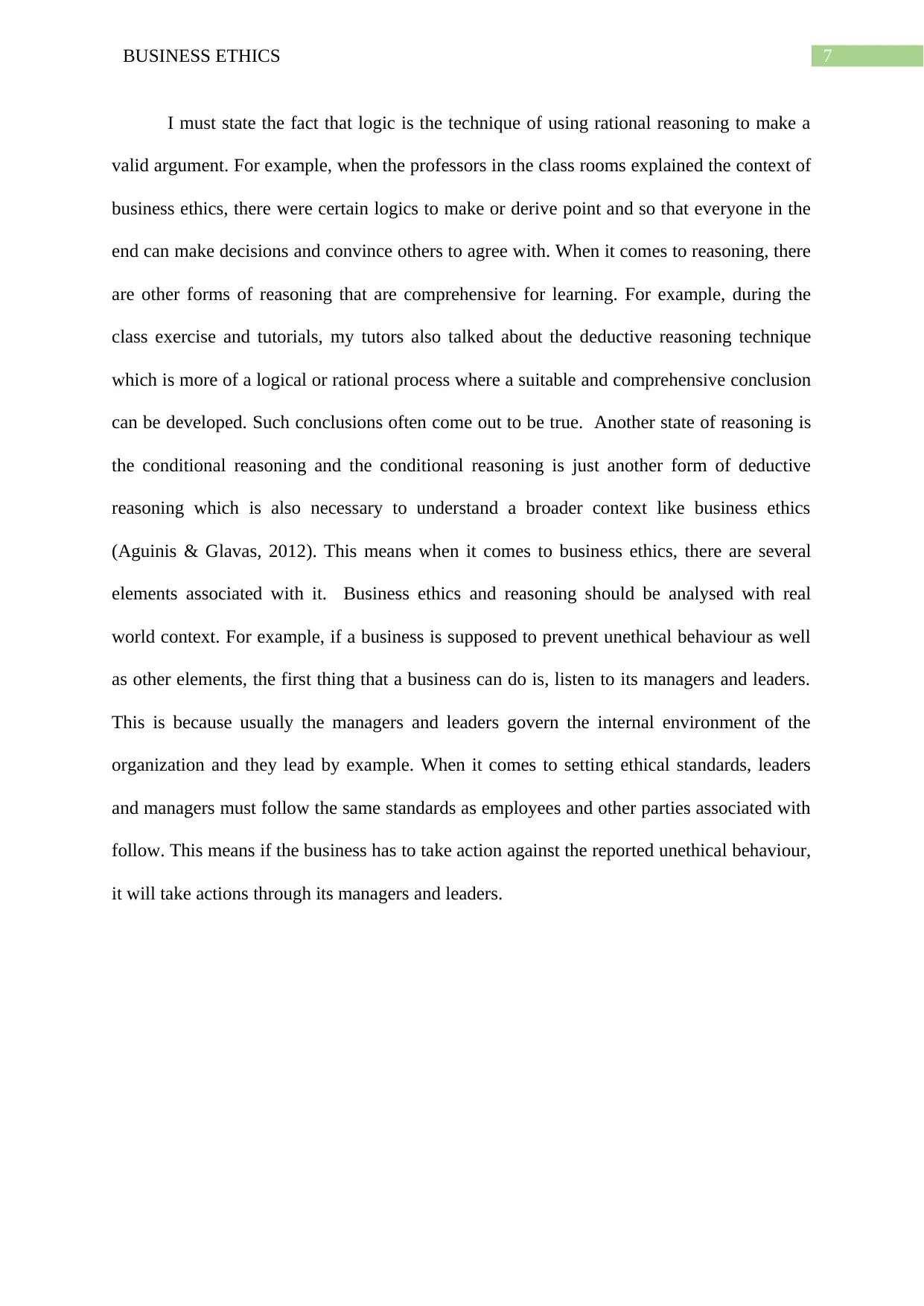
7BUSINESS ETHICS
I must state the fact that logic is the technique of using rational reasoning to make a
valid argument. For example, when the professors in the class rooms explained the context of
business ethics, there were certain logics to make or derive point and so that everyone in the
end can make decisions and convince others to agree with. When it comes to reasoning, there
are other forms of reasoning that are comprehensive for learning. For example, during the
class exercise and tutorials, my tutors also talked about the deductive reasoning technique
which is more of a logical or rational process where a suitable and comprehensive conclusion
can be developed. Such conclusions often come out to be true. Another state of reasoning is
the conditional reasoning and the conditional reasoning is just another form of deductive
reasoning which is also necessary to understand a broader context like business ethics
(Aguinis & Glavas, 2012). This means when it comes to business ethics, there are several
elements associated with it. Business ethics and reasoning should be analysed with real
world context. For example, if a business is supposed to prevent unethical behaviour as well
as other elements, the first thing that a business can do is, listen to its managers and leaders.
This is because usually the managers and leaders govern the internal environment of the
organization and they lead by example. When it comes to setting ethical standards, leaders
and managers must follow the same standards as employees and other parties associated with
follow. This means if the business has to take action against the reported unethical behaviour,
it will take actions through its managers and leaders.
I must state the fact that logic is the technique of using rational reasoning to make a
valid argument. For example, when the professors in the class rooms explained the context of
business ethics, there were certain logics to make or derive point and so that everyone in the
end can make decisions and convince others to agree with. When it comes to reasoning, there
are other forms of reasoning that are comprehensive for learning. For example, during the
class exercise and tutorials, my tutors also talked about the deductive reasoning technique
which is more of a logical or rational process where a suitable and comprehensive conclusion
can be developed. Such conclusions often come out to be true. Another state of reasoning is
the conditional reasoning and the conditional reasoning is just another form of deductive
reasoning which is also necessary to understand a broader context like business ethics
(Aguinis & Glavas, 2012). This means when it comes to business ethics, there are several
elements associated with it. Business ethics and reasoning should be analysed with real
world context. For example, if a business is supposed to prevent unethical behaviour as well
as other elements, the first thing that a business can do is, listen to its managers and leaders.
This is because usually the managers and leaders govern the internal environment of the
organization and they lead by example. When it comes to setting ethical standards, leaders
and managers must follow the same standards as employees and other parties associated with
follow. This means if the business has to take action against the reported unethical behaviour,
it will take actions through its managers and leaders.
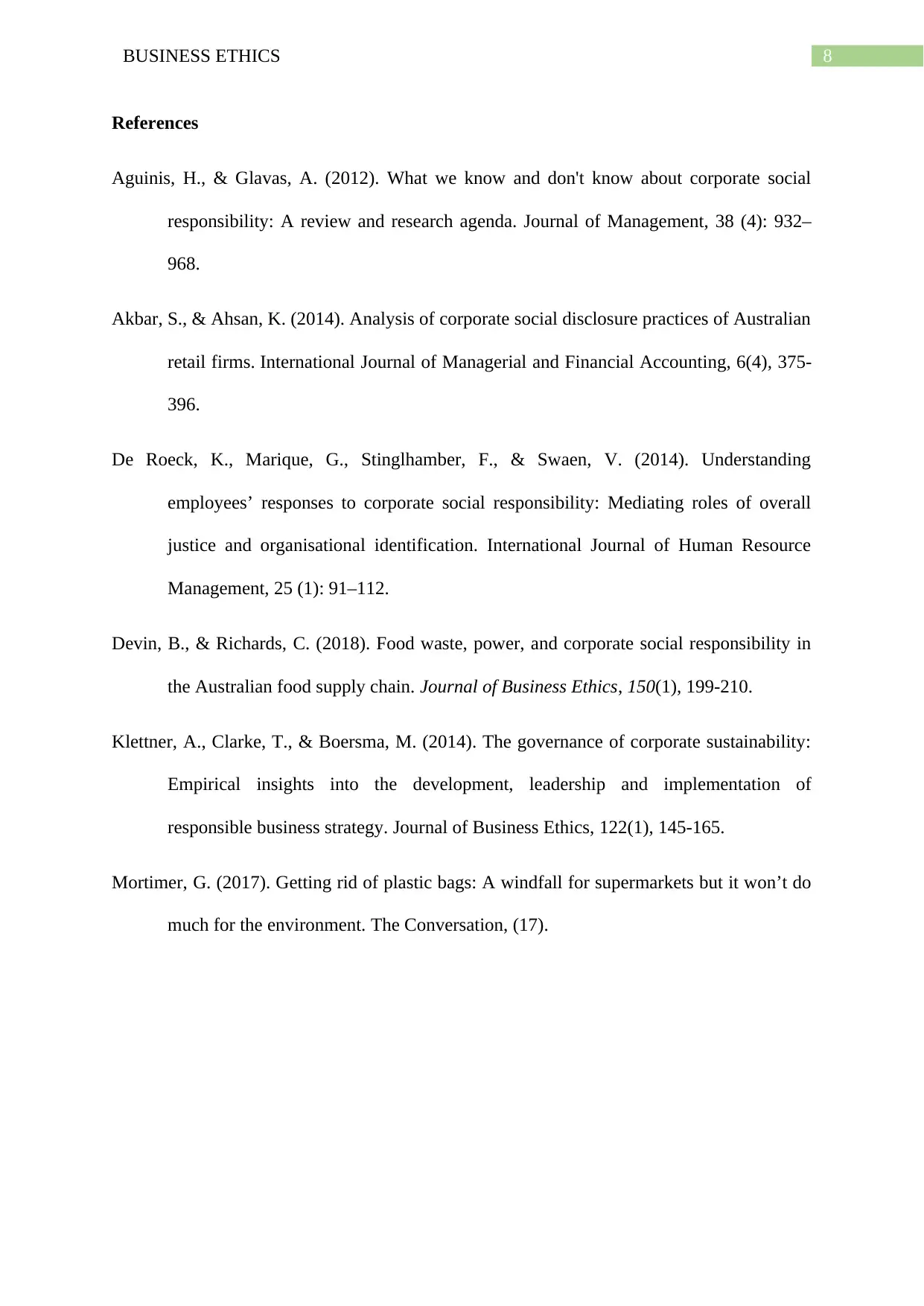
8BUSINESS ETHICS
References
Aguinis, H., & Glavas, A. (2012). What we know and don't know about corporate social
responsibility: A review and research agenda. Journal of Management, 38 (4): 932–
968.
Akbar, S., & Ahsan, K. (2014). Analysis of corporate social disclosure practices of Australian
retail firms. International Journal of Managerial and Financial Accounting, 6(4), 375-
396.
De Roeck, K., Marique, G., Stinglhamber, F., & Swaen, V. (2014). Understanding
employees’ responses to corporate social responsibility: Mediating roles of overall
justice and organisational identification. International Journal of Human Resource
Management, 25 (1): 91–112.
Devin, B., & Richards, C. (2018). Food waste, power, and corporate social responsibility in
the Australian food supply chain. Journal of Business Ethics, 150(1), 199-210.
Klettner, A., Clarke, T., & Boersma, M. (2014). The governance of corporate sustainability:
Empirical insights into the development, leadership and implementation of
responsible business strategy. Journal of Business Ethics, 122(1), 145-165.
Mortimer, G. (2017). Getting rid of plastic bags: A windfall for supermarkets but it won’t do
much for the environment. The Conversation, (17).
References
Aguinis, H., & Glavas, A. (2012). What we know and don't know about corporate social
responsibility: A review and research agenda. Journal of Management, 38 (4): 932–
968.
Akbar, S., & Ahsan, K. (2014). Analysis of corporate social disclosure practices of Australian
retail firms. International Journal of Managerial and Financial Accounting, 6(4), 375-
396.
De Roeck, K., Marique, G., Stinglhamber, F., & Swaen, V. (2014). Understanding
employees’ responses to corporate social responsibility: Mediating roles of overall
justice and organisational identification. International Journal of Human Resource
Management, 25 (1): 91–112.
Devin, B., & Richards, C. (2018). Food waste, power, and corporate social responsibility in
the Australian food supply chain. Journal of Business Ethics, 150(1), 199-210.
Klettner, A., Clarke, T., & Boersma, M. (2014). The governance of corporate sustainability:
Empirical insights into the development, leadership and implementation of
responsible business strategy. Journal of Business Ethics, 122(1), 145-165.
Mortimer, G. (2017). Getting rid of plastic bags: A windfall for supermarkets but it won’t do
much for the environment. The Conversation, (17).
⊘ This is a preview!⊘
Do you want full access?
Subscribe today to unlock all pages.

Trusted by 1+ million students worldwide
1 out of 9
Related Documents
Your All-in-One AI-Powered Toolkit for Academic Success.
+13062052269
info@desklib.com
Available 24*7 on WhatsApp / Email
![[object Object]](/_next/static/media/star-bottom.7253800d.svg)
Unlock your academic potential
Copyright © 2020–2026 A2Z Services. All Rights Reserved. Developed and managed by ZUCOL.





